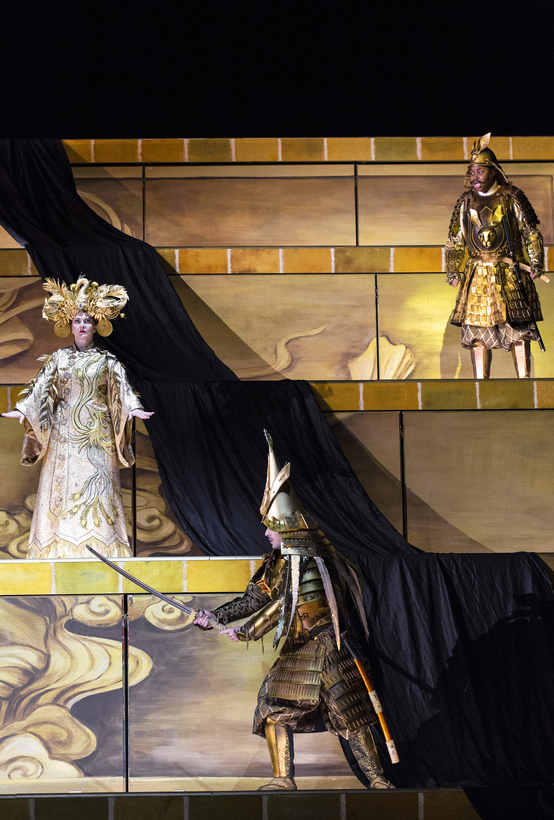Mozart’s breakout opera Mitridate, Re di Ponto (Mithridates, King of Pontus), written when he was 14, unfolds like a game of chess, and no wonder. It is Roman history by way of Jean Racine, grand master of French classical tragedy, a genre so formal as to verge on algebra. Satoshi Miyagi’s production—filmed live at the Staatsoper, Berlin, in December—takes a liberty in transposing the action from pre-Christian Asia Minor to pre-industrial Japan, but his passion for meaningful design suits the material to a T.
Mitridate was composed in Bologna in the summer of 1770. “My fingers ache from writing all those recitatives,” young Wolfgang wrote his mother at home in Salzburg, referring to the type of singsong dialogue that carries the story forward. Curiously, he made no complaint about the reams of steeple-chase coloratura that mark the arias for the competitive and highly exhibitionistic cast of seven characters. Luckily, Mozart’s 33-year-old colleague Josef Mysliviček from Prague—fêted as il divino Boemo or “the divine Bohemian”—was summering in Bologna, too, a source of inspiration, expertise, and moral support.
There’s trouble in Pontus as Mitridate begins. The eponymous warrior-king is missing and presumed dead. Of his two sons, one makes common cause with Rome. Both, however, are in love with their father’s fiancée. Who should show up next but the king, leading a foreign princess he means to marry to the unrulier of his boys. And so, the traps are sprung.

All gold and ivory, Miyagi’s production unfolds on four terraces of what might be a shrine, an impressive set that at first seems inert yet proves startlingly dynamic. The initial appearance of the cast changes, too. At first, everyone wears fantasy armor or court dress emblazoned with heraldic animals, but as military history segues to private disappointments and clashes of desire, the human beings within come out of their shells.
Never, however, does Miyagi permit his players to emote. It’s the geometry of the stage that communicates who’s up, who’s down, and the vibrancy of the music that expresses a character’s inner life. Some will call Miyagi’s blocking static, and maybe it is—but only superficially. The director has the wisdom to treat Mitridate as a late blossom of Baroque opera in the mold of Handel and Vivaldi. In no sense does this precocious showpiece anticipate the free-flow “classical” masterpieces Mozart had yet to invent.
In tandem with his period band Les Musiciens du Louvre, the French early-music specialist Marc Minkowski delivers rainbow colors and crackling passion. The rising Samoan superstar tenor Pene Pati flails to an extent in the helter-skelter acrobatics of Mitridate’s opening aria but stick around—there’s plenty more where that came from, and before long, he’s acing it.
The half-dozen high-voiced princes, princesses, and others in the cast deliver intensity, personality, and pinpoint accuracy. As Mitridate’s hot-headed son Farnace, the smoky countertenor Paul-Antoine Bénos-Djian strikes the most individual, least conventional note. The mezzo-soprano Angela Brower shines like a beacon as Farnace’s straight-arrow brother Sifare—never brighter than in the aria “Lungi da te,” duetting with an unidentified onstage virtuoso on the valveless “natural” horn.
Mitridate is available for streaming on the medici.tv Web site
Matthew Gurewitsch writes about opera and classical music forAIR MAIL.He lives in Hawaii

